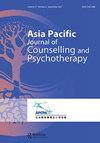School counselling based on humanistic principles: A pilot randomized controlled trial in Hong Kong
IF 0.5
4区 心理学
Q4 PSYCHOLOGY, CLINICAL
Asia Pacific Journal of Counselling and Psychotherapy
Pub Date : 2020-06-22
DOI:10.1080/21507686.2020.1781667
引用次数: 3
Abstract
ABSTRACT This study assessed the feasibility of conducting a randomized controlled trial on a humanistic counselling intervention and obtained indications of its effectiveness. Thirty-three participants were assigned to either a treatment or a control group. Outcome measures were the Young Person’s Clinical Outcomes in Routine Evaluation (YP-CORE) and the Strengths and Difficulties Questionnaire (SDQ). Reductions in psychological distress were found in the treatment group compared to the control group on the YP-CORE, the SDQ total difficulty score, and the SDQ emotional symptoms subscale. At three-month follow-up, the intervention effects were sustained in the YP-CORE and SDQ hyperactivity subscale. The study suggests that a fully powered trial is feasible, and that the intervention is effective in reducing psychological distress in Chinese adolescents.基于人本主义原则的学校辅导:香港的随机对照试验
摘要本研究评估了进行人文咨询干预的随机对照试验的可行性,并获得了其有效性的指标。33名参与者被分配到治疗组或对照组。结果测量是年轻人常规评估的临床结果(YP-CORE)和优势和困难问卷(SDQ)。与对照组相比,治疗组的YP-CORE、SDQ总难度得分和SDQ情绪症状分量表的心理困扰有所减少。在三个月的随访中,YP-CORE和SDQ多动分量表的干预效果是持续的。这项研究表明,一项全面的试验是可行的,干预措施在减少中国青少年的心理困扰方面是有效的。
本文章由计算机程序翻译,如有差异,请以英文原文为准。
求助全文
约1分钟内获得全文
求助全文

 求助内容:
求助内容: 应助结果提醒方式:
应助结果提醒方式:


